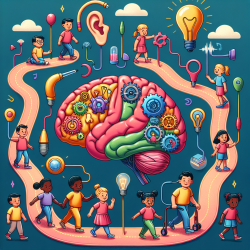Introduction
In the realm of speech-language pathology, the intersection of hearing loss and cognitive development in children is a critical area of study. A recent research article titled "Comparative Analysis of Intellectual Quotient in Developmental Population with Severe Hearing Loss: Hearing Aids vs. Cochlear Implant Users" provides valuable insights into how different auditory rehabilitation technologies impact children's cognitive abilities.
The Study: A Closer Look
This prospective study involved 21 children aged 6.5 to 8 years with severe to profound bilateral hearing loss. The children were divided into two groups: those using cochlear implants (CI) and those using hearing aids (HA). The primary objective was to compare the effects of these devices on the children's intellectual quotient (IQ) after one year of auditory rehabilitation combined with speech therapy.
Key Findings
- No statistically significant differences in overall IQ scores between CI and HA users after one year of rehabilitation.
- Children with cochlear implants showed better verbal comprehension and processing speed indices compared to those with hearing aids.
- Early intervention (before 36 months of age) is crucial for maximizing cognitive development.
Implications for Practitioners
For practitioners, these findings emphasize the importance of early auditory rehabilitation and the selection of appropriate hearing devices based on individual hearing thresholds. While cochlear implants may offer advantages in specific cognitive subtests, hearing aids also provide significant benefits, especially when used early in a child's development.
Practitioners should consider the following:
- Regular follow-ups to monitor auditory thresholds and device performance.
- Incorporating comprehensive speech therapy to enhance cognitive outcomes.
- Providing strong psychological and sociological support to families to optimize rehabilitation success.
Encouraging Further Research
While the study presents promising preliminary results, the small sample size necessitates further research. Larger studies with diverse populations are needed to confirm these findings and explore additional factors influencing cognitive development in children with hearing loss.
Conclusion
This study underscores the potential of both cochlear implants and hearing aids in supporting cognitive development in children with severe hearing loss. Early intervention and the appropriate choice of auditory devices are key to optimizing outcomes. As practitioners, staying informed about the latest research and tailoring interventions to individual needs will ensure the best possible outcomes for children.
To read the original research paper, please follow this link: Comparative Analysis of Intellectual Quotient in Developmental Population with Severe Hearing Loss: Hearing Aids vs. Cochlear Implant Users.










